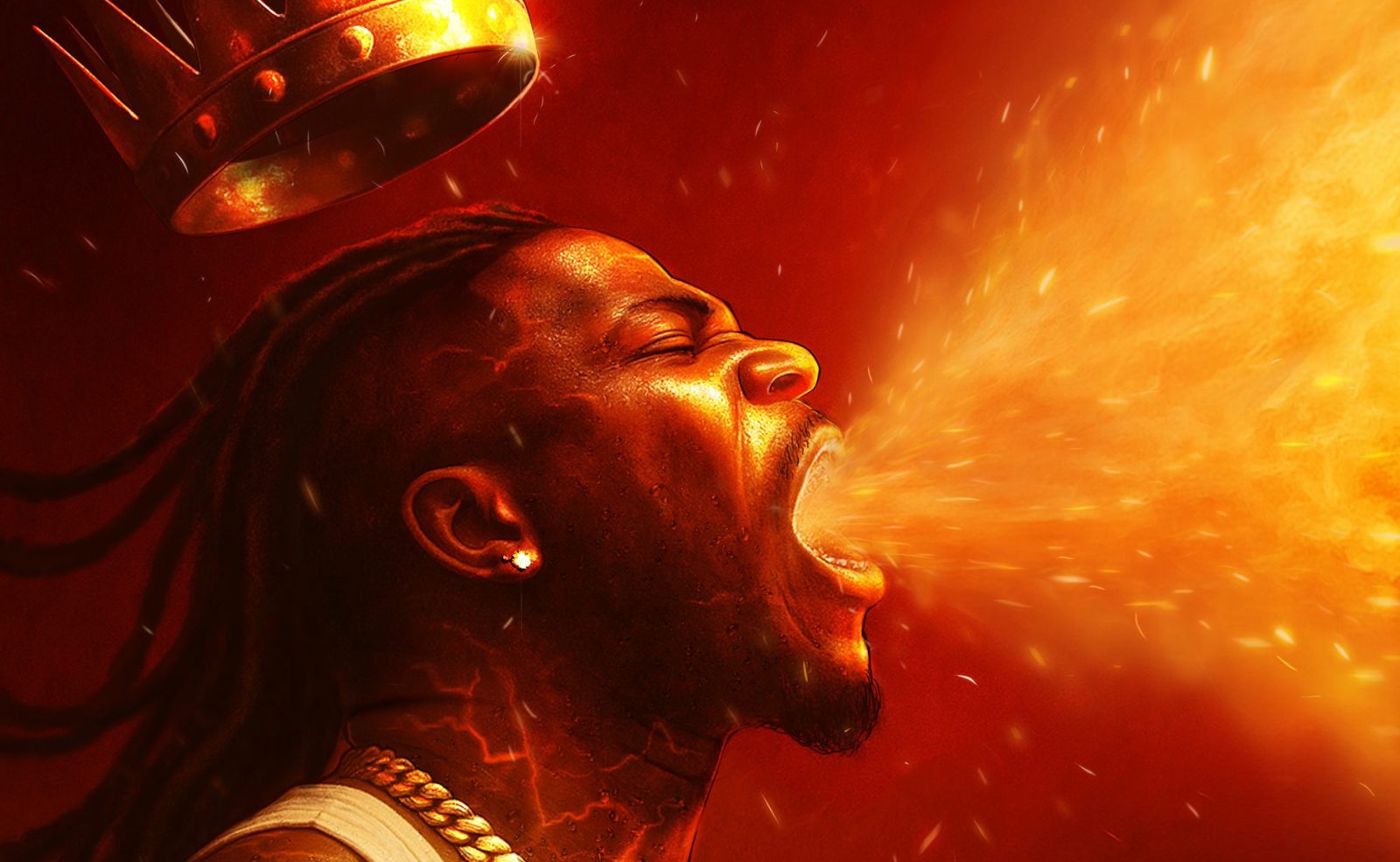The Torcher is a smooth, enjoyable listen that manages to pack breadth and depth into a relatively compact runtime. The energy never flags, the stylistic variety touches every base, and each listener is likely to find something of their own within its spectrum.
By Yinoluwa Olowofoyeku
Livingstone Etse Satekla, better known as Stonebwoy, has risen from the streets of Ashaiman to become one of Ghana’s most decorated and influential artiste, celebrated for his mastery of Reggae, Dancehall, and Afro-Pop. Through his Burniton Music Group imprint, he has steadily built a career that balances local authenticity with global ambition, earning accolades such as the Best International Act: Africa award at the 2015 BET Awards and multiple Ghana Music Awards, which cemented his place at the centre of the country’s contemporary sound.
His catalogue spans over a decade of work, from early singles and breakthrough hits to albums that have consistently pushed the boundaries of his chosen genres. In 2023, he released his fifth studio album, 5th Dimension, which debuted on Billboard’s Reggae Albums chart and further expanded his international profile. Alongside these achievements, his high-profile collaborations and commanding festival performances have positioned him as one of the continent’s most visible musical ambassadors.
It is within this trajectory of global recognition and continued innovation that his latest project, The Torcher, arrives in 2025, extending the story of an artiste who has long used his music to illuminate both the spirit of Ghana and the reach of African sound.
The Torcher begins with “Intro”, a spoken-word delivery from OgeeTheMc that sets the tone with a lofty proclamation: “a single flame, a beam of light gives us the guidance and directions… captain of the Afro-Dancehall wave, he’s been sailing, from Africa to the Caribbean on his mission to spread the word to the rest of the world”.

These words unfurl over ostinato strings and cinematic orchestral drums, while haunting choral vocals and thumping percussion build an atmosphere that feels both devotional and triumphant. It serves not only as a prelude but also as a positioning of Stonebwoy as a torchbearer, a directional force in Afro-Dancehall, staking his claim as a figure impossible to ignore in the current landscape.
That momentum flows into the title track, “Torcher”, which embodies the album’s central metaphor. Bright electric key chords and chopped vocal samples glide atop smooth Afro-Swing drums, creating an uplifting palette that frames Stonebwoy’s self-affirmation. He extols his place in the industry with melodies both colourful and commanding, weaving between nimble runs and soaring high notes. His patois delivery is as forceful as ever, but here it feels melodic, almost glowing — a reminder of why his voice continues to lead Afro-Dancehall’s charge.
“Send Dem A Prayer” pulls back the pace with a textured arrangement that begins with synth bass and arpeggios before giving way to piano stabs, sparse bass guitar, and percussion-assisted dancehall drums. Group vocals and layered synths lift the chorus into an anthem, while the verses leave space for Stonebwoy’s versatile performance, shifting between quickfire patois delivery and smooth sung passages.
The song reveals a heartfelt core, as he prays not only for himself but also for his detractors: “Positivity and my heart is clean/ Me never jealous another man thing/ Anyway, anyway/ See me a pray for my enemies though dem want my failure/ Peace be unto my haters/ Them no want to see me rise, I still send them a prayer”.
The Amapiano-fuelled “Gidi Gidi (Fire)” glows with smooth pads, lively mallets, bright synth accents, and a rumbling bass that gives depth to the groove. Stonebwoy switches his cadence in moments reminiscent of “Tshwala Bam”, while weaving in Twi lyricism for the first time on the record.
The track is a statement of self-assured calmness, addressing misconceptions about his composure: “Me just a live up my life/ And I make my money/ Me no worry about anybody/ Don’t see me like a fool because I don’t do gidi gidi”. Group vocals drive the chorus, giving the song communal weight, as the artist reminds listeners that composure does not equal weakness.
On “Samandkudi”, an arpeggiated synth chord line and sine bass create a sparse yet dark melodic atmosphere. Pads and buzzing synths flesh out the space, while Afrobeats drums keep the rhythm minimal. Stonebwoy declares from the outset that this is “a song for the girls”, but it is also a showcase of his sultry, braggadocious energy. His lyrics balance sensuality with swagger: “A you a pree mi inna mi drop top/ Summer time and your body feel hot/ Girl, I got the water to cool your thirst/ Hype them a hype but nobody badder / Designer, King Kong, Gucci, father/ Fat body girl a fi your season yah”. It is flirtatious, boastful, and driven by his charismatic presence, a reminder of his versatility in tone and mood.
“Outside Lifestyle” bursts with bright synth plucks and key solos before settling into sparse Afrobeats drums anchored by a crunchy snare. A smooth sub-bass and subtle mallet accents fill out the low end while leaving air around the vocals.
Stonebwoy sits at the top of his register, layering catchy melodies, expert harmonies, and playful ad-libs to deliver a vibrant ode to living life to the fullest. It is celebratory, buoyant, and feels like a soundtrack to nights of unbridled joy.
With “Susuka”, the palette shifts again. Strummed guitars meet grime- and drill-adjacent drums, creating a harder sonic edge. Stonebwoy leans into a lower, gruffer tone, rapping with urgency before softening into a hauntingly melodic chorus. He weaves in Twi while balancing his delivery between rap and song, pushing his vocal dexterity.
The inclusion of Kumasi’s Beeztrap Kotm and Yaw Tog electrifies the track, their aggressive Twi verses cutting against soft ad-libs and harmonies. The result is a bass-heavy drill anthem with surprising emotional depth, showcasing Stonebwoy’s ability to spotlight Ghana’s rising generation without losing the weight of his own presence.

“Xosetor” deepens the exploration of drill and trap textures, pairing thumping 808 basslines with Hip-Hop drums, sparse e-piano chords, and understated mallets. Rich pads provide warmth, cushioning the stark rhythms. Stonebwoy raps in Ewe with a firm delivery, asserting linguistic and cultural range, while Agbeshie and Kenny Ice join with equally sharp verses. The song balances punchy, straightforward flows with moments of melodic lift, making it a powerful nod to regional diversity as much as a testament to Ghana’s evolving hip hop landscape.
The closing track on The Torcher, “Deeper”, returns to Reggae’s heartbeat with bright synth brass, a prominent bassline, and triplet drums. The rhythm is buoyant yet grounding, with staccato hits accenting Stonebwoy’s motivational refrains. He frames the song as a vessel of consciousness and spiritual strength, using his own career path as a beacon of perseverance.
His words brim with conviction: “Deeper, deeper, deeper/ Never give up in the life, cuz mi believe in the God mode, deeper/ It’s all about Godly confidence to trample over obstacles and pestilence/ Ghetto youth, prefer intelligence/ I never tell them to go fake it till you make it/ I rather tell them to practice and perfect it”. Here, he places himself not only as a performer but as a thought leader, closing The Torcher with an inspirational manifesto that reinforces its central themes.
The Torcher is a project built around a central theme of Stonebwoy as both industry driver and torchbearer, and what is striking is that he does not have to declare it repeatedly. Instead of dwelling directly on the idea in his lyrics, he shows it through action, crafting a body of work that embodies the title by virtue of its ambition, construction, and execution. It is a case of show rather than tell, and the result is an album immaculately put together, standing as a testament to his experience and his stature within the industry.
For anyone who does not usually listen to Stonebwoy, the first surprise will be his versatility. While he has built his reputation primarily as an Afro-Dancehall titan, The Torcher reveals a breadth of artistry that stretches far beyond that foundation.
Across the tracklist, he shifts fluidly from Reggae to Hip-Hop, and from Dancehall to shades of Afrobeats, adjusting his energy, delivery style, and tone with ease. The adaptability he displays is remarkable, never once sounding out of place, regardless of genre or instrumental backdrop.
The production mirrors this variety, providing him with a wide palette of styles and moods. At some points, the beats are bright and uplifting, at others moody and reflective, giving Stonebwoy different pathways to explore.
Some instrumentals are left sparse, opening up space for him to vocally dominate through performance, while others are richly layered, with his vocals woven in as one more instrument in the tapestry.
All of it is stitched together with seamless engineering, balancing layers of harmonies, ad-libs, and subtle vocal effects that accentuate the essence of each song. The detail in the production and mixing elevates the project, providing colour and polish without ever overwhelming the core performances.
Perhaps, the most striking revelation for the casual listener, though, is the dexterity of Stonebwoy’s voice. Those who might expect roughshod patois delivery throughout will be pleasantly surprised by the clarity, control, and technicality of his singing. His voice carries strength, with a range that is broader and more agile than many give him credit for.
His melodic ability is evident across the project, as he shifts nimbly through cadences, shapes harmonies with precision, and layers vocals in ways that show a deep understanding of texture. His deep register resonates with grit and authority, while his higher range displays surprising flexibility, straining in places but always maintaining tone and never breaking.

What ties his performances together is not just technique but honesty and straightforward lyricism. Dancehall and its adjacent styles may not traditionally be praised for lyrical depth, but Stonebwoy pushes against those assumptions. Across the project, he uses his platform to tell his truth, whether about his personal life, his outlook, or his philosophy.
He places positivity, hope, and resilience at the centre, and frequently frames his messages in ways that speak directly to the youth. His role as a leader is reinforced not only by his words but by his actions, particularly in his choice of collaborators.
By platforming Ghana’s young and emerging voices and giving them space within his own project, he reinforces his position as a mentor and role model, ensuring that his torch also lights paths for others.
Altogether, The Torcher is a smooth, enjoyable listen that manages to pack breadth and depth into a relatively compact runtime. The energy never flags, the stylistic variety touches every base, and each listener is likely to find something of their own within its spectrum.
The Torcher is lively yet thoughtful, celebratory yet grounded, and ultimately a project that reflects both Stonebwoy’s excellence and his longevity. Befitting of the king of Afro-Dancehall, it stands as another high point in a career already filled with milestones, and as a fresh marker of his influence on the present and future of African music.
Lyricism – 1.5
Tracklisting – 1.5
Sound Engineering – 1.6
Vocalisation – 1.6
Listening Experience – 1.5
Rating – 7.7/10
Yinoluwa “Yinoluu” Olowofoyeku is a multi-disciplinary artist and creative who finds expression in various media. His music can be found across all platforms and he welcomes interaction on his social media @Yinoluu.



